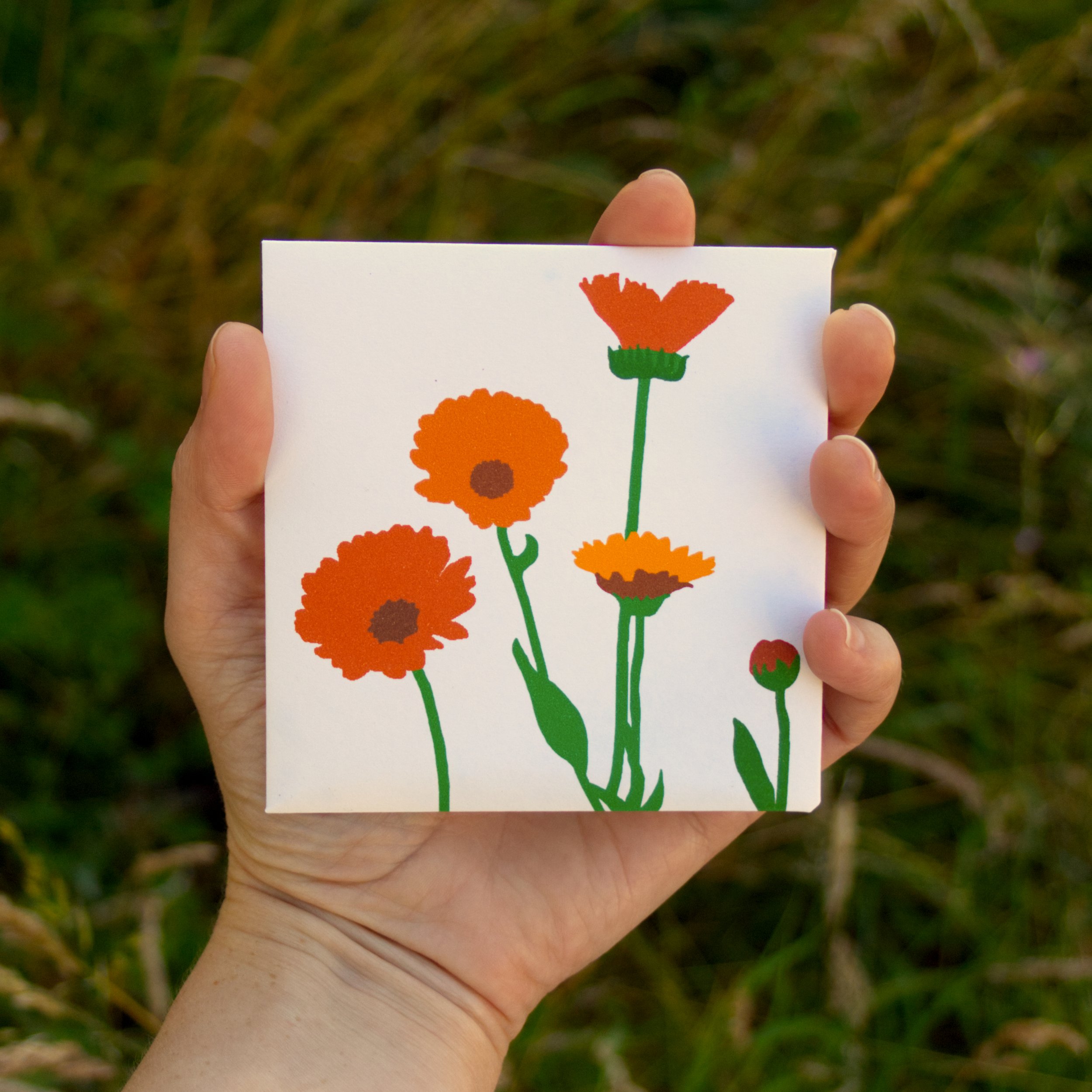 Image 1 of 8
Image 1 of 8

 Image 2 of 8
Image 2 of 8

 Image 3 of 8
Image 3 of 8

 Image 4 of 8
Image 4 of 8

 Image 5 of 8
Image 5 of 8

 Image 6 of 8
Image 6 of 8

 Image 7 of 8
Image 7 of 8

 Image 8 of 8
Image 8 of 8









melyn mair - welsh botanical card with pot marigold seeds
Handmade illustrated A6 blank card, with pot marigold seeds to sow and grow. Card, envelope and seed packet made from 100% recycled paper.
Cultivated in gardens since the Middle Ages, marigolds can be found growing wild in the south of Britain and across Europe. ‘Pot’ refers to the cooking pot, as the bright orange flower heads have long been used as a natural colourant in cheese, eggs and baked goods, as well as making a cheaper alternative to saffron (although the flavour can’t be matched).
According to Welsh folklore, a broth made with marigolds could promote appetite and induce sleep. The Medieval Physicians of Myddfai advised a recipe involving blending marigolds with wine, vinegar, strong mead or ale, that supposedly ‘if you are taken ill, you will need no other than this as your only drink’. They also believed it was a an effective protector against the plague.
The common English name marigold derives from ‘Mary’s gold’, so named by early Christians after the mother of Jesus who supposedly used the flower buds as currency. The Welsh melyn mair, means Yellow Mary, perhaps reinforcing the story of Mary’s gold, or potentially referring to the colour of the flower. Swyn from swyn-ystres means charm or spell, possibly describing the seemingly magical healing powers of the plant, or its role in casting spells.
Calendula officinalis has vulnerary, anti-inflammatory, choleretic and antispasmodic properties. It’s particularly good soothing skin and is a popular component in natural skin care products. Marigolds are very easy to grow and make good companion plants for vegetables. They are rampant self-seeders, so once established you’ll never need to buy seeds again!
Handmade in Pembrokeshire from 100% recycled card.
Handmade illustrated A6 blank card, with pot marigold seeds to sow and grow. Card, envelope and seed packet made from 100% recycled paper.
Cultivated in gardens since the Middle Ages, marigolds can be found growing wild in the south of Britain and across Europe. ‘Pot’ refers to the cooking pot, as the bright orange flower heads have long been used as a natural colourant in cheese, eggs and baked goods, as well as making a cheaper alternative to saffron (although the flavour can’t be matched).
According to Welsh folklore, a broth made with marigolds could promote appetite and induce sleep. The Medieval Physicians of Myddfai advised a recipe involving blending marigolds with wine, vinegar, strong mead or ale, that supposedly ‘if you are taken ill, you will need no other than this as your only drink’. They also believed it was a an effective protector against the plague.
The common English name marigold derives from ‘Mary’s gold’, so named by early Christians after the mother of Jesus who supposedly used the flower buds as currency. The Welsh melyn mair, means Yellow Mary, perhaps reinforcing the story of Mary’s gold, or potentially referring to the colour of the flower. Swyn from swyn-ystres means charm or spell, possibly describing the seemingly magical healing powers of the plant, or its role in casting spells.
Calendula officinalis has vulnerary, anti-inflammatory, choleretic and antispasmodic properties. It’s particularly good soothing skin and is a popular component in natural skin care products. Marigolds are very easy to grow and make good companion plants for vegetables. They are rampant self-seeders, so once established you’ll never need to buy seeds again!
Handmade in Pembrokeshire from 100% recycled card.
Handmade illustrated A6 blank card, with pot marigold seeds to sow and grow. Card, envelope and seed packet made from 100% recycled paper.
Cultivated in gardens since the Middle Ages, marigolds can be found growing wild in the south of Britain and across Europe. ‘Pot’ refers to the cooking pot, as the bright orange flower heads have long been used as a natural colourant in cheese, eggs and baked goods, as well as making a cheaper alternative to saffron (although the flavour can’t be matched).
According to Welsh folklore, a broth made with marigolds could promote appetite and induce sleep. The Medieval Physicians of Myddfai advised a recipe involving blending marigolds with wine, vinegar, strong mead or ale, that supposedly ‘if you are taken ill, you will need no other than this as your only drink’. They also believed it was a an effective protector against the plague.
The common English name marigold derives from ‘Mary’s gold’, so named by early Christians after the mother of Jesus who supposedly used the flower buds as currency. The Welsh melyn mair, means Yellow Mary, perhaps reinforcing the story of Mary’s gold, or potentially referring to the colour of the flower. Swyn from swyn-ystres means charm or spell, possibly describing the seemingly magical healing powers of the plant, or its role in casting spells.
Calendula officinalis has vulnerary, anti-inflammatory, choleretic and antispasmodic properties. It’s particularly good soothing skin and is a popular component in natural skin care products. Marigolds are very easy to grow and make good companion plants for vegetables. They are rampant self-seeders, so once established you’ll never need to buy seeds again!
Handmade in Pembrokeshire from 100% recycled card.